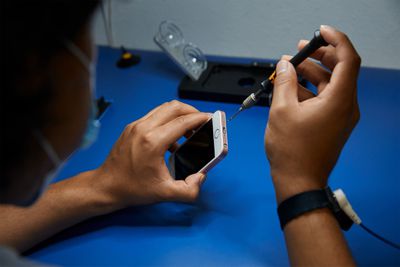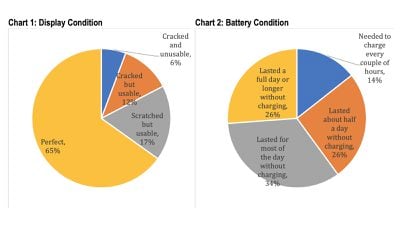Very few iPhone users will repair their own iPhone to postpone their next smartphone purchase, despite the Self Service Repair program, according to research by Consumer Intelligence Research Partners (CIRP).

Earlier this week, Apple announced the Self Service Repair program, giving customers who are comfortable with the idea of completing their own repairs access to Apple genuine parts, tools, and manuals, starting with the iPhone 12 and iPhone 13 lineups. While the scheme has been met with praise from Right to Repair advocates, it seems that few iPhone users will take advantage of it in practice.
CIRP's research suggests that almost all iPhones in use have a display in "useable" condition and most iPhones have a battery in "useable" condition. 12 percent of iPhone displays are cracked but useable, and just six percent are unusable and in need of replacement. 26 percent of iPhone batteries are said to provide battery life lasting half a day without charging, and 14 percent need to be charged every couple of hours. Battery replacements are therefore likely to be among the most common repairs, but comparatively few active devices are in need of replacing either of these parts that are subject to a high level of wear and tear.

The small number of active devices in need of replacement parts, combined with the fact that many users will not be comfortable completing their own repairs, indicates that very few iPhone users will actually take advantage of the Self Service Repair program. CIRP Partner and Co-Founder Mike Levin said:
It seems battery life affects consumers more than screen condition. 14 percent of iPhone buyers reported needing to charge a battery in their old iPhone every few hours. Only six percent of iPhone buyers said they had a cracked screen that made the old phone unusable, while another 12 percent had a cracked screen that was still useable. Of course, buyers have many reasons for upgrading from an old iPhone, including processor performance or storage capacity. So, at best a small fraction of buyers are likely to postpone a new iPhone purchase by repairing an old phone through the Self Service Repair program.
Since most new iPhone buyers already have "more than adequately usable phones," "few owners would use the Self Service Repair program to postpone their next iPhone purchase," according to CIRP's Josh Lowitz.
The Self Service Repair program will be available to users starting early next year in the United States and expand to additional countries throughout 2022.
CIRP's findings are based on a survey of 2,000 Apple customers in the U.S. that purchased an Apple Watch, iPhone, iPad, or Mac between October 2020 and September 2021.























